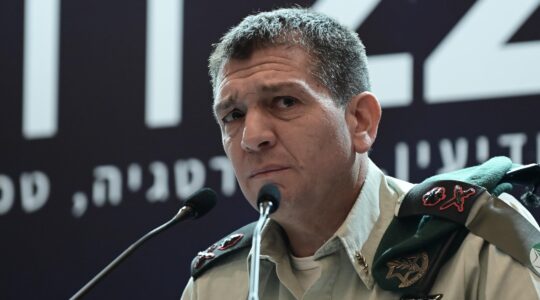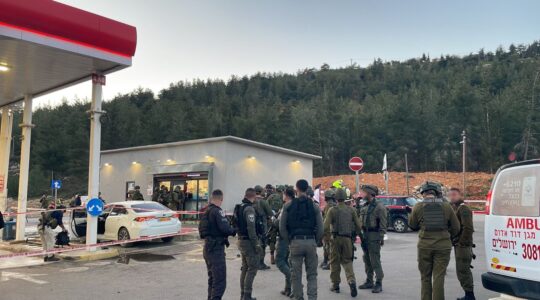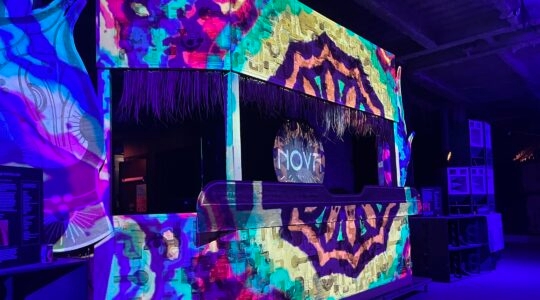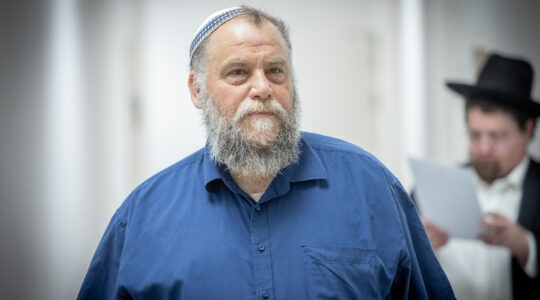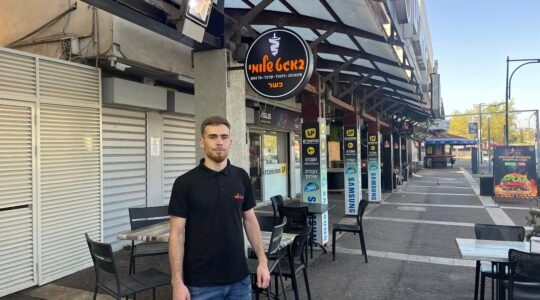JERUSALEM (JTA) – As the Annapolis conference kicked into high gear, Israeli TV stations broadcast commentary from besuited correspondents lined up in front of cloudy Chesapeake Bay.
But one reporter, Yinon Magal of Channel 10, chose a more modest urban backdrop: the southern Israeli town of Sderot, its streets deserted for fear of Kassam rocket attacks from the nearby Gaza Strip.
“Residents here know that no matter what happens, in the end they get Kassams falling on their heads,” Magal said when asked whether the people in Sderot seemed interested in the Annapolis peace summit.
For all the hopeful rhetoric in Maryland by U.S. President George W. Bush, Israeli Prime Minister Ehud Olmert and Palestinian Authority President Mahmoud Abbas, back in the Middle East distrust and hostility showed their deep roots.
In Gaza, thousands of demonstrators who turned out for a Hamas rally chanted “Death to Israel, Death to the United States.” In Jerusalem, some 15,000 Israelis descended upon the Western Wall to pray for the Annapolis conference to fail.
But for many mainstream Israelis, Annapolis held little interest, mostly because they saw the politicians’ declarations as offering little new material after a string of similar summits in recent years.
On the front pages of Israeli newspapers, stories about Olmert’s aims at Annapolis competed with opinion pieces that played down any chances of a diplomatic breakthrough.
While some in the region were buoyed by last-minute decisions by Syria, Saudi Arabia and Lebanon to join the Annapolis conference, few Israelis or Palestinians said they expected peace to come soon.
Abbas, having lost the Gaza Strip to Hamas, is widely considered by Israelis and Palestinians to be too weak to guarantee security. Olmert’s pledge Tuesday to wrap up peace talks by the end of 2008 rang hollow given predictions that his fractious coalition government could fall apart within months.
“Annapolis is a long way away, in every sense,” said Jerusalem taxi driver Elazar Cohen. “Olmert and Abbas want to give it a try? Great. But I don’t know anyone who’s hopeful.”
A TV survey conducted after Tuesday’s speeches at Annapolis found that just 15 percent of Israelis now expect a breakthrough in peace efforts with the Palestinians. Sixty-two percent of respondents to the Channel 1 survey predicted there would be more diplomatic stalemate accompanied by an escalation in terrorism.
“I think it is good that our government is willing to attend the conference in Annapolis, and I hope something will come out of it,” said Hilla Rechel, a Tel Aviv student. “But unfortunately I am not sure we will have a solution in the near future.”
With Gaza in Hamas hands, some Israeli analysts said Abbas’ goal at Annapolis was more limited than comprehensive peace.
“As far as Abu Mazen is concerned, this is a process for salvaging the West Bank,” said Ehud Yaari, a veteran Israeli analyst of Arab affairs, using Abbas’ nickname.
With the West Bank’s future at stake, Hamas and Israeli settler groups denounced Abbas and Olmert, respectively, for their “treacherous” leadership.
“Let them go to a thousand conferences,” Hamas leader Mahmoud al-Zahar told a Gaza rally. “We say in the name of the Palestinian people that we did not authorize anyone to sign any agreement that harms our rights.”
Abu Abed Abu Karsh, a Gaza storekeeper, said of Bush, “All he wants to achieve at the conference is normalization between Israel and the Arab world while forfeiting the Palestinian cause.”
In the West Bank, Abbas’ security forces responded violently to anti-Annapolis demonstrations, killing one, wounding dozens and arresting scores of Hamas sympathizers.
Yussuf Rimawi, a Ramallah resident, saw a double standard in the Abbas administration and, by extension, its U.S. and Israeli backers.
“When Mahmoud Abbas wants democracy, he makes democracy, and when he doesn’t, he doesn’t,” Rimawi said.
Throughout the conference on the other side of the Atlantic, Israel’s countermeasures against Palestinian terrorists continued apace. On Tuesday in Gaza, Israeli forces killed three Palestinians, at least two of them Hamas gunmen, and Gaza rocket crews fired at least one rocket at the Sderot area.
Danny Dayan, head of the Yesha settler council, said Olmert had entered a hasty negotiations framework to “allow George Bush to get the Nobel Peace Prize” before he leaves office.
“A Palestinian state would be a threat to the very existence of Israel and would only bring more instability to the region and the world,” Dayan said.
Israeli Arab lawmaker Ahmed Tibi, a longtime adviser to Palestinian leaders, called the criticism premature. He said the Israeli right has nothing to worry about yet because no agreements have been made on the creation of a Palestinian state.
“We have seen previous promises for an agreement that have not been met,” Tibi said.
For many Israelis, Iran’s nuclear program is more pressing.
Apparently in an effort to upstage the Annapolis conference – to which it was not invited – Iran unveiled a new missile Tuesday capable of reaching Israel.
With Syria and Saudi Arabia at Annapolis, Dan Gillerman, Israel’s ambassador to the United Nations, said he hoped the conference would allow Israel and Arab states to close ranks against Iran.
“There’s a slogan used by Greyhound, ‘Getting there is half the fun,’ ” Gillerman told an Israeli reporter in Annapolis. “I think with everyone who came here, we have a chance of turning it into a coalition not just against Iran but for peace.”
Yet Eli Shani of Netanya wondered whether a policy of exclusion is best.
“The problem is not Abbas but Hamas and Iran, and both of them are not in Annapolis,” Shani said. “So I don’t know how this can help us.”
